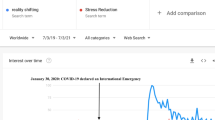Abstract
The article argues that there is a specific role for narrative consciousness in our understanding of justified responsibility ascription. Starting from a short review of empirical findings that suggest that we do not consciously control our actions, the article proceeds to spell out a concept of willed actions that does justice to the scientific results, conceptual requirements, and our most important intuitions on the ascription of responsibility. In order to do this, the article develops a concept of how narrative monitoring can be said to control actions that are performed on very small time scales. This concept understands narrative monitoring as the self interpretation and disambiguation of complex cognitive systems. Finally, consequences of this concept for the ascription of responsibility are explored.
Similar content being viewed by others
References
Anscombe, G.E.M., The First Person, in Q. Cassam (ed.), Self-Knowledge. Oxford: Oxford University Press, 1994.
Bargh, J. A. and Gollwitzer, P. M., The Automated Will: Nonconscious Activation and Pursuit of Behavioural Goals. Journal of Personality and Social Psychology 81(6), 2001, pp. 1014–1027.
Blackmore, S., Memes and the Malign User Illusion. Paper presented at the ASSC 4, Brussels, 2000.
Castiello, U. and Jeannerod, M., Measuring Time to Awareness. NeuroReport 2 (1991), pp. 797–800.
Claxton, G., Whodunnit? Unpicking The ‘Seems’ of Free Will, in B. Libet, A. Freeman and K. Sutherland (eds.), The Volitional Brain – Towards a Neuroscience of Free Will. Thorverton: Imprint Academic, 1999.
Davidson, D., Freedom to Act, in T. Honderich (ed.), Essays on Freedom of Action. London, Routledge, 1973.
de Vignemont, F. and Fourneret, P., The Sense of Agency: A Philosophical and Empirical Review of the “Who” System. Consciousness and Cognition 13, 2004, pp. 1–19.
Dennett, D., Elbow Room. Cambridge MA: MIT Press, 1984.
Dennett, D.C., The Self as the Center of Narrative Gravity, in F. Kessel, P. Cole and D. Johnson (eds.), Self and Consciousness: Multiple Perspectives. Hillsdale, NJ: Erlbaum, 1992, pp. 103–115.
Dretske, F., Explaining Behaviour: Reasons in a World of Causes. Cambridge MA: MIT Press, 1988.
Fischer, J. and Ravizza, M., Responsibility and Control. Cambridge: Cambridge University Press, 1998.
Flanagan, O., Multiple Identity, Character Transformation, and Self-Reclamation, in G. Graham and L. Stephens (eds.), Philosophical Psychopathology. Cambridge MA: MIT Press, 1994, pp. 135–162.
Frankfurt, H., Freedom of the Will and the Concept of a Person. Journal of Philosophy 67(1) (1971), pp. 5–20.
Gallagher, S., Philosophical Conceptions of the Self: Implications for Cognitive Science. Trends in Cognitive Science 4(1) 2000.
Gazzaniga, M., Brain Modules and Belief Formation. In F. Kessel, P. Cole and D. Johnson (eds.), Self and Consciousness. Hillsdale: Erlbaum, 1992.
Glenberg, A.M., What Memory is for. Behavioral and Brain Sciences 20 (1997), pp. 1–55.
Graham, G., Doing Something Intentionally and Moral Responsibility. Canadian Journal of Philosophy 11(4) (1981), pp. 667–677.
Hacking, I., Rewriting the Soul. Princeton NJ: Princeton University Press, 1995.
Haggard, P. and Eimer, M., On the Relation Between Brain Potentials and Voluntary Action. MPI Paper, 1998.
Humphreys, G. and Riddoch, J., Fractionating the Intentional Control of Behaviour: A Neuropsychological Analysis. In J. Roessler and N. Eilan (eds.), Agency and Self-Awareness. Oxford: Oxford University Press, 2003.
Hurley, S., Imitation, Media Violence, And Freedom of Speech. Philosophical Studies 117 (2004), pp. 165-218.
Kerby, A.P., Narrative and the Self. Bloomington, Indianapolis: Indiana University Press, 1991.
Libet, B., Unconscious Cerebral Initiative and the Role of Conscious Will in Voluntary Action. The Behavioral and Brain Sciences 8 (1985), pp. 529–566.
Mele, A., Springs of Action. Oxford: Oxford University Press (1992).
Mele, A., Acting Intentionally: Probing Folk Notions. In B. Malle, L. Moses and D. Baldwin (eds.), Intentions and Intentionality: Foundations of Social Cognition. Cambridge MA: MIT Press, 2001, pp. 27–44.
Nelson, K., The Psychological and Social Origins of Autobiographical Memory. Psychological Science, 1993.
Pacherie, E., The Content of Intentions. Mind and Language 15(4) (2000), pp. 400–432.
Proust, J., Perceiving Intentions, in J. Roessler and N. Eilan (eds.), Agency and Self-Awareness: Issues in Philosophy and Psychology. Oxford: Oxford University Press, 2003.
Roessler, J. and Eilan, N. (eds.), Agency and Self-Awareness. Oxford: Oxford University Press, 2003.
Searle, J., Intentionality. Cambridge: Cambridge University Press, 1983.
Shoemaker, S. Self-Knowledge and Self-identity. Ithaca: Cornell Press, 1963.
Smith, J.D., Shields, W.E. and Washburn, D.A., The Comparative Psychology of Uncertainty Monitoring and Metacognition. Behavioural and Brain Sciences 26(3) (2003), pp. 317–339.
Taylor, C., Human Agency and Language. Cambridge: Cambridge University Press, 1985.
Velleman, D., What Happens When Someone Acts? Mind 101 (1992), pp. 461–481.
Velleman, D., The Self as Narrator. Available at http://www-personal.umich.edu/~velleman/Work/Dennett.pdf.
Vierkant, T., Is the Self Real? Münster: LIT-Verlag, 2003.
Vierkant, T., Zombie Mary and the Blue Banana. Psyche 8 (19), 2003.
Watson, G., Free Agency. In G. Watson (ed.), Free Will. Oxford: Oxford University Press, 1982.
Wegner, D. M., The Illusion of Conscious Will. Cambridge MA: MIT Press, 2002.
Author information
Authors and Affiliations
Corresponding author
Rights and permissions
About this article
Cite this article
Vierkant, T. Owning Intentions and Moral Responsibility. Ethic Theory Moral Prac 8, 507–534 (2005). https://doi.org/10.1007/s10677-005-5990-5
Accepted:
Published:
Issue Date:
DOI: https://doi.org/10.1007/s10677-005-5990-5



